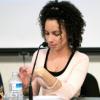
Dr Carolina Alves
Fellow
Economics at Girton is a challenging but very rewarding course. Given the College’s traditions and values it is perhaps unsurprising that Economics is taught in a manner that is sensitive to a variety of different interests and perspectives. Whilst the more technical mainstream material is taught thoroughly and rigorously, the intention is that this should not be to the exclusion of other sub-disciplines and approaches. More specifically, it is the firm belief of all the Economics Fellows at Girton that Economics is a subject that requires not only well developed mathematical skills, but also a good deal of political and historical knowledge alongside a keen policy awareness. Moreover, the fact that the three Economics Fellows pursue such different research topics guarantees that students experience the subject from a range of challenging and often competing perspectives.
Cambridge provides one of the best courses in Economics in the world. The subject was essentially invented in Cambridge by Alfred Marshall and transformed throughout the 20th Century by those such as John Maynard Keynes, Nicolas Kaldor and Girton’s own Joan Robinson, whose ideas are currently very much back in vogue. There is a large community of economists at Girton, including nearly 30 undergraduates.
The student-run economics society, the Joan Robinson Society (JRS), is also a very active and integral feature of the Girton Economics landscape. The JRS is both a social and academic group, which acts to bring students from all years together regularly. Talks take place one or two times a term and are given not only by eminent academics, but by speakers from a cross-section of the economics and finance industries. Recent talks have been given by old Girtonians from the Bank of England, Deutsche Bank, venture capital firms, and a range of other financial institutions. The Society provides not only an intimate and unintimidating setting in which to meet and question leading names in the academic and business worlds, but also provides a forum for students across years to share ideas and experiences, a good example being those events where finalists present their dissertations to students in the first and second years.
Our students embark on careers in a number of different fields.
Most of our students apply to and start their first jobs in the City of London either working in investment banks or consulting and accounting firms. Some go into the civil service in the UK or their home country; others enter jobs in central banks such as the Bank of England.
A few students continue their studies here at Cambridge on the MPhil and PhD programmes while others apply elsewhere in the UK, Europe and the rest of the world.